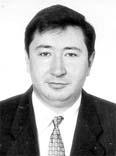Efremenko, Dimitri | Russia

Dmitri Efremenko (Dr. Phil.) was born in Moscow, Russia, in 1967. He studied history at the Lomonossov State University (Moscow), gaining a diploma in 1989, with postgraduate studies at the Institute for Philosophy, Russian Academy of Sciences, and the University of Karlsruhe (Germany).
In 2000 he completed a dissertation on the philosophical aspects of technology assessment, and since 1997 he has worked as a scientist at the International Institute for Global Problems of Sustainable Development, International Independent University of Environmental & Political Studies (Moscow).
His main research interests are: philosophy of technology, technology assessment, sustainable development in the countries in transition, international climate policy.
From October 2000 to September 2001 he was Fellow at the Institute for Advanced Studies on Science, Technology and Society, Graz.
Project at IAS-STS: Technology Assessment as an instrument of prospective environmental and technological policy
The project is a logical extension of my earlier research into the philosophical problems of Technology Assessment. The project will focus on societal and political aspects of TA in the context of the sustainability paradigm. TA will be analysed from the point of view of the search for an optimal model of interrelations between science, politics and society. TA is interpreted as a social learning process and as an important contribution towards public acceptance of political decisions in the field of new technologies and environmental protection. Public participation in TA requires the development of new theoretical approaches, methods and institutional models of Technology Assessment.
A separate part of the project is devoted to the use of TA within countries in transition, and primarily in Russia. During the last ten years, relatively little effort has been made to analyse the long term needs of Russia in the field of science, technology development and its effects. TA activity in Russia is still dispersed. This dispersion is a specific negative response to the supercentralisation of the Soviet Era. Current political and social changes have resulted in the qualitative modification of the status and goals of science and technology. Nowadays, both science and technology could be considered as engines of a human- and environmentally-oriented modernisation of Russia. But the great importance of science and technology within the transformation process makes new approaches to the forecast and evaluation of technological and environmental challenges necessary. I suppose that Technology Assessment is one of these approaches.
Selected Publications
Die Probleme der Institutionalisierung der Technikfolgenabschätzung in Rußland. - TA- Datenbank - Nachrichten, Nr.1, 7.Jahrgang - März 1998.
Russian Way to Information Society and New Understanding of Information Security. // Veda, Technika, Spolecnost (Science, Technology, Society) / Teorie Vedy (Theory of Science), VIII (XXI) 1-2, 1999, Praha.
Technology Assessment and Technology Forecasting: Modern Status and Perspectives // Futures Research Quaterly. Fall 1999, Volume 15, Number 3.
Double Challenge: Sustainability and Socio -Economic Transition in Post-Communist Countries / Proceedings of the 2nd International Summer Academy on Technology Studies: Strategies of a Sustainable Product Policy. IFZ, Graz, 2000.
